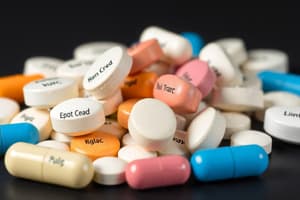Podcast
Questions and Answers
What does the suffix -pril indicate?
What does the suffix -pril indicate?
- Diuretic
- Anti-diabetic
- Beta Blocker
- ACE Inhibitor (correct)
What type of medication is indicated by the suffix -olol?
What type of medication is indicated by the suffix -olol?
- Beta Blocker (correct)
- Anti-fungal
- Cholesterol
- Antibiotic
What does the suffix -sartan represent?
What does the suffix -sartan represent?
- A2RB (correct)
- Steroid
- Anti-depressant
- Calcium Channel Blocker
What type of medication is indicated by the suffix -statin?
What type of medication is indicated by the suffix -statin?
What does the prefix pred- indicate?
What does the prefix pred- indicate?
What type of medication is indicated by the suffix -asone?
What type of medication is indicated by the suffix -asone?
The suffix -olone signifies which type of medication?
The suffix -olone signifies which type of medication?
What does the suffix -thiazide refer to?
What does the suffix -thiazide refer to?
What type of medication is represented by the suffix -gliptin?
What type of medication is represented by the suffix -gliptin?
The suffix -zepam is associated with which type of medication?
The suffix -zepam is associated with which type of medication?
What does the suffix -zolam represent?
What does the suffix -zolam represent?
The suffix -zodone is associated with which type of medication?
The suffix -zodone is associated with which type of medication?
What does the suffix -nazole indicate?
What does the suffix -nazole indicate?
What does the prefix ceph- refer to?
What does the prefix ceph- refer to?
What does the suffix -cillin indicate?
What does the suffix -cillin indicate?
The suffix -cyclin refers to which type of medication?
The suffix -cyclin refers to which type of medication?
What does the suffix -mycin refer to?
What does the suffix -mycin refer to?
The suffix -floxacin signifies which type of medication?
The suffix -floxacin signifies which type of medication?
What does the suffix -vir indicate?
What does the suffix -vir indicate?
What does the suffix -eprazole refer to?
What does the suffix -eprazole refer to?
The suffix -oprazole indicates which type of medication?
The suffix -oprazole indicates which type of medication?
What does the suffix -tidine signify?
What does the suffix -tidine signify?
What does the suffix -dipine indicate?
What does the suffix -dipine indicate?
Flashcards are hidden until you start studying
Study Notes
Drug Prefixes and Suffixes Study Notes
-
-pril: Classifies as an ACE inhibitor; commonly used to treat hypertension and heart failure by relaxing blood vessels.
-
-olol: Indicates a beta blocker; used primarily to manage cardiac conditions like hypertension and arrhythmias by blocking adrenaline effects.
-
-sartan: Represents Angiotensin II receptor blockers (A2RB); effective in lowering blood pressure and protecting kidney function in diabetic patients.
-
-statin: Associated with cholesterol-lowering drugs; commonly prescribed for hyperlipidemia to reduce cardiovascular risk.
-
pred-: Denotes steroids; utilized for their anti-inflammatory and immunosuppressive effects in various medical conditions.
-
-asone: Another steroid identifier; similarly employed in treating inflammatory and autoimmune disorders.
-
-olone: Indicates steroids; often used in the management of various conditions including asthma and skin disorders.
-
-thiazide: Signifies thiazide diuretics; effective in management of hypertension and edema by promoting urine production.
-
-gliptin: Refers to a class of anti-diabetic medications; aids in glycemic control for type 2 diabetes by increasing insulin release.
-
-zepam: Marks benzodiazepines; prescribed for anxiety, muscle spasms, and seizures due to their calming effects on the CNS.
-
-zolam: Another benzodiazepine suffix; used similarly for anxiety disorders and panic attacks.
-
-zodone: Characteristic of anti-depressants; often targets serotonin receptors to alleviate symptoms of depression.
-
-nazole: Signifies antifungal medications; used in treating a variety of fungal infections by inhibiting fungal cell membrane synthesis.
-
ceph-: Indicates cephalosporin antibiotics; a broad class used to treat diverse bacterial infections by disrupting cell wall synthesis.
-
-cillin: Denotes penicillin antibiotics; effective against a wide range of bacterial infections, particularly gram-positive bacteria.
-
-cycline: Refers to tetracycline antibiotics; used to treat various infections and conditions like acne due to their broad-spectrum activity.
-
-mycin: Represents macrolide antibiotics; effective against respiratory infections and skin infections by inhibiting bacterial protein synthesis.
-
-floxacin: Characteristic of fluoroquinolone antibiotics; broad-spectrum agents used for treating various bacterial infections.
-
-vir: Indicates antiviral medications; utilized for managing viral infections such as HIV, herpes, and influenza.
-
-eprazole: Signifies proton pump inhibitors (PPIs); used for reducing stomach acid to treat conditions like GERD and peptic ulcers.
-
-oprazole: Another form of proton pump inhibitor; similarly functions to reduce gastric acid production.
-
-tidine: Identifies H2 antagonists; used to decrease stomach acid production and treat conditions like ulcers and heartburn.
-
-dipine: Refers to calcium channel blockers; effective in lowering blood pressure and treating angina by relaxing heart and blood vessel muscles.
Studying That Suits You
Use AI to generate personalized quizzes and flashcards to suit your learning preferences.





